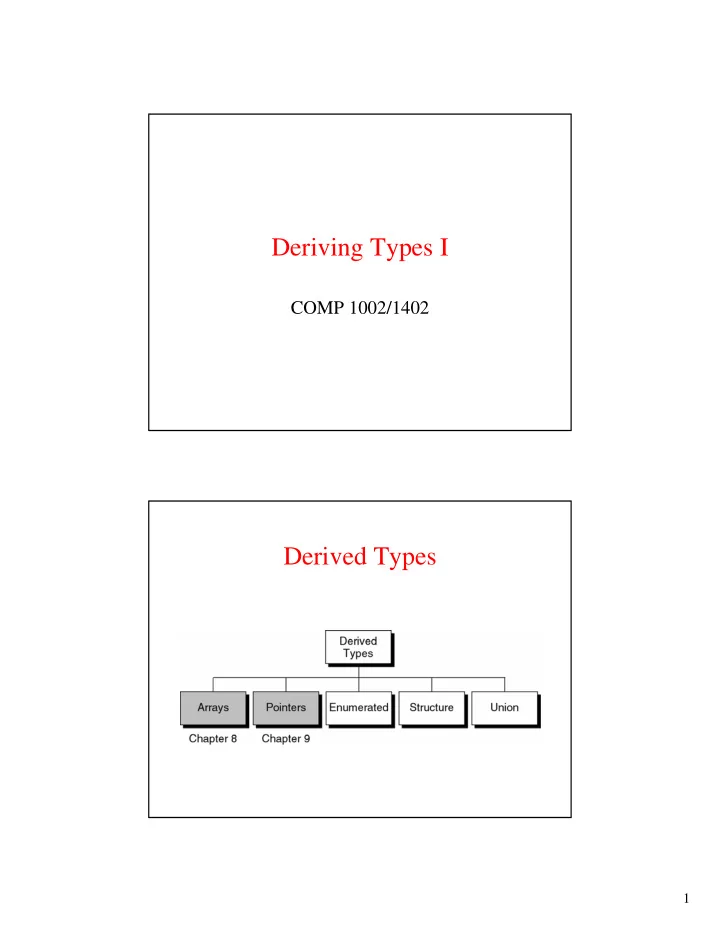

Deriving Types I COMP 1002/1402 Derived Types 1
The Type Definition typedef – complex types defined as a different name typedef Examples: typedef unsigned int ASIZE; char *stringPtrAry[20]; Replace with: typedef char* STRING; /* STRING is a “type” - a ptr to a char */ STRING stringPtrArray[20]; 2
Enumerations Identifies symbols with integers Built on top of integers enum 3
enum Defining a single enumeration variable: enum {sun, mon, tue, wed, thur, fri, sat} days; days = mon; if (days == mon) printf("I don’t like Mondays\n"); enum Technically: sun is 0 , mon is 1 , tue is 2 , … Therefore: days = 1; /* This is valid */ Careful! C does no range checking! 4
enum How to assign different associated numbers? enum { sun=1, mon=2, tue=3, wed=4, thur=5, fri=6, sat=7 } days; Or enum { sun=1, mon, tue, wed, thur, fri, sat } days; Enumerations Caution: ISO/ANSI C is not strict with enum Don’t mix enum symbols with integer variables Even if possible This, of course, depends on the compiler. Use: enum symbols to replace constants! 5
enum Defining Multiple enumeration variables with the same values! enum DaysOfWeek {sun=1, mon, tue, wed, thur, fri, sat}; enum DaysOfWeek today; enum DaysOfWeek yesterday; typedef & enum 6
Structures A structure is a collection of related elements A field is the smallest element of named data that has meaning An array has elements of the same type A structure can have elements of different types Examples of Structures 7
Def. : Single Structure Variables student Variable struct { char id[10]; char name[26]; int gradePoints; } student; 8
Multiple Structure Variables student Variables struct student { char id[10]; char name[26]; int gradePoints; }; struct student aStudent; struct student topStudent; void printStudent (struct student Stu); 9
Defining Structure Types STUDENT type typedef struct { char id[10]; char name[26]; int gradePoints; } STUDENT; STUDENT aStudent; STUDENT topStudent; void printStudent (STUDENT Stu); 10
struct Summary Initializing 11
Accessing Given the aStudent variable, access its fields : Use the . Operator aStudent.id aStudent.name aStudent.gradePoints if (sam2.u == 'A') sam2.x += sam2.y; scanf("%d %d %f %c", &sam2.x, &sam2.y, &sam2.t, &sam2.u); sam2.x++; sam2.y++; 12
Comments on Precedence • The . Operator has a very high precedence sam.x++ ++sam.x &sam.x Are equivalent to: (sam.x)++ ++(sam.x) &(sam.x) Example Using Structs #include<stdio.h> typedef struct { int numerator; int denominator; } FRACTION; /* write multiplyFraction (...)*/ 13
Structure Operations Assignment works on whole structures! sam2 = sam1; /* copies contents of sam1 into sam2!! */ Can’t do Comparison == would compare all bits in structure But some hardware require items start on word boundaries! floats must start at address divisible by ?6? ints must start at address divisible by ?4? 14
Structures Aren’t Packed! A Structure and its bytes: a string bytes 0-24 bytes 25-29 (nothing but noise) a float in bytes bytes 30-35 (Divisible by 6) a char in byte 36 bytes 37-39 (nothing but noise) an int in bytes 40-43 (Divisible by 4) Pointers to Structures 15
Pointers to Structures (*ptr).x (*ptr).y (*ptr).t (*ptr).u Don’t forget these parentheses!!!! Common mistake : It’s deadly. Why ??? Dereference ptr.x (if ptr is a var : precedence !!!) Pointers to Structures 16
An Easier Way (Selection) (*pointerName).fieldName Is the same as: pointerName->fieldName Pointer Selection Operator 17
Precedence of Selection Precedence of -> Is Identical to . This implies they are equally high ! Example typedef struct { int hr; int min; int sec; } CLOCK; void increment(CLOCK *clock); void show(CLOCK *clock); 18
Recommend
More recommend